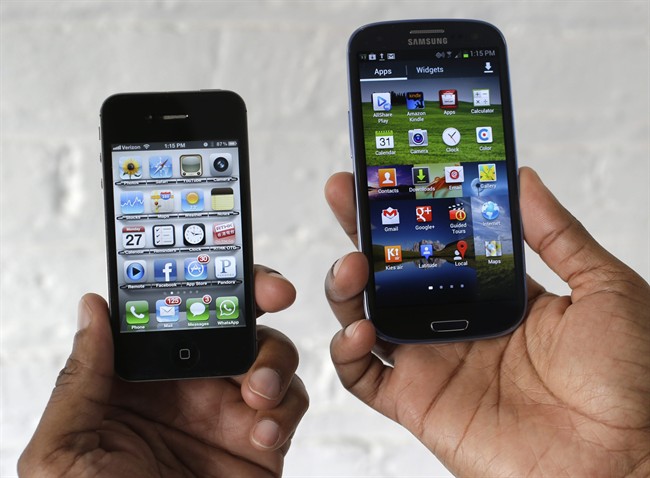SAN JOSE, Calif. – When a jury ordered Samsung to pay Apple $119 million for copying features of the iPhone, it was the latest chapter in the worldwide legal fight between the top two smartphone companies.

Friday’s damage award was far less than the $2.2 billion Apple demanded and the $930 million a previous jury ordered Samsung to pay after an earlier patent trial involving older-generation products. The jury also trimmed $158,000 from the latest award after finding Apple infringed one of Samsung’s patents in making the iPhone line.
READ MORE: Samsung says it owes Apple $52 million
Both companies have filed lawsuits and other legal actions in Germany, England, France, South Korea, Japan, the Netherlands, Australia and elsewhere with mixed results.
Although U.S. District Judge Lucy Koh in San Jose urged the companies to settle their differences, a settlement conference in February ended without an agreement and no end in litigation is in sight.
So, who’s winning?
It depends on the definition of victory.
Samsung Electronics Co. has surpassed Apple Inc. as the top smartphone maker on the planet. Samsung has captured 31 per cent of the $330 billion worldwide market compared with Apple’s 15.6 per cent.
- Canada Post strike left 215K passports in limbo – and more delays could come
- Heading into election year, cost of living still dominates voter priorities
- Boxing Day shoppers take advantage of tax holiday amid cost-of-living woes
- Health Canada recalls stuffed animal toys on Christmas Eve over choking risk
What about the two U.S. jury verdicts ordering Samsung to pay Apple a combined $1 billion for patent infringement?

Get weekly money news
Samsung, which has $41 billion in cash reserves, has yet to pay Apple a dime. The South Korean company is appealing the 2012 verdict ordering it to pay $930 million and it’s expected to appeal the $119 million verdict rendered Friday. More important, courts have refused to bar U.S. sales of any Samsung device found to have infringed Apple patents, so Samsung continues to sell the products at issue in the United States.
Why is Apple continuing its aggressive legal campaign?
“Apple simply cannot walk away from its inventions,” Apple lawyer Harold McElhinny told jurors during closing arguments last week.
Samsung lawyers argued during the trial that Apple’s real target is Google Inc., the maker of the Android software that Samsung and other smartphone makers use in their devices. Though Google wasn’t party to the litigation in San Jose, the search giant played a prominent role in the trial. Samsung lawyers presented an email Apple co-founder Steve Jobs sent to top executives in 2010 ordering them to wage a “holy war” on Android in 2011. Jobs and top Apple executives view Google’s software as a direct rip-off of Apple’s operating system. Samsung’s lawyers argued that Apple targeted the South Korean company because Samsung is the top Android user.
What are the two companies fighting over?
The legal battle is rooted in Samsung’s launch of the Galaxy S in early 2010. Apple accused Samsung of ripping off many features of the iPhone to create the Galaxy S. Apple filed the first of two lawsuits in the United States in 2011 covering the Galaxy S and other older generation Samsung devices.
READ MORE: Court to reconsider Apple’s request to block Samsung phones from market
Apple filed a second lawsuit in 2012 alleging that many current Samsung products are violating Apple patents. The latest jury verdict found that Samsung violated two of Apple’s patents, including software that enables the “slide-to-unlock” function. Jurors found Apple violated a Samsung patent that helps smartphone users organize their photos and videos.
What’s next?
Each company will ask the judge in San Jose to ban sales of the devices found to infringe the other’s patents. Legal experts said those arguments are likely to fail because lawyers have to prove consumers, for instance, purchased iPhones solely because of the Samsung photo organizational patent. Apple lawyers will have to prove that consumers who purchased Samsung devices did so because of the “slide-to-unlock” feature.







Comments